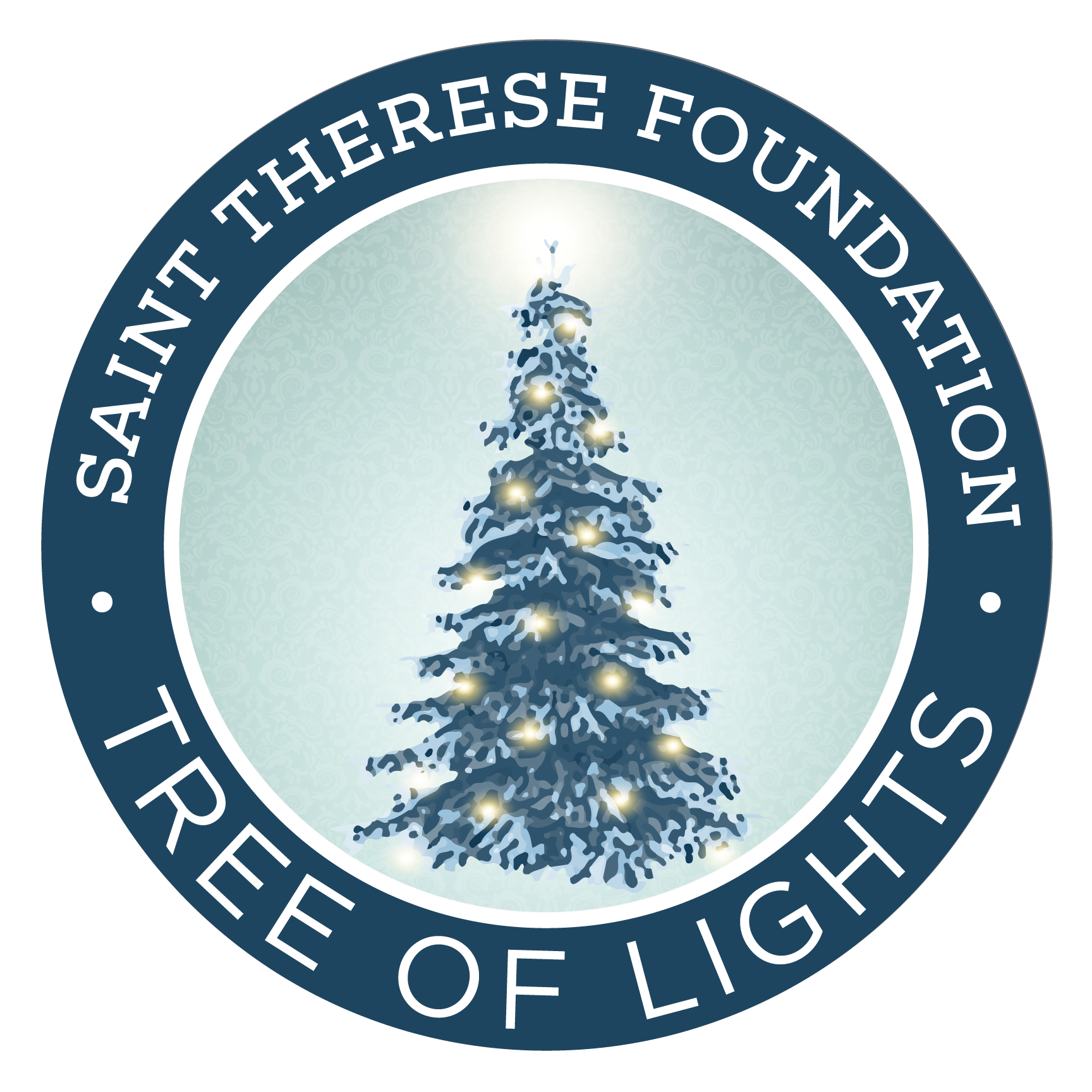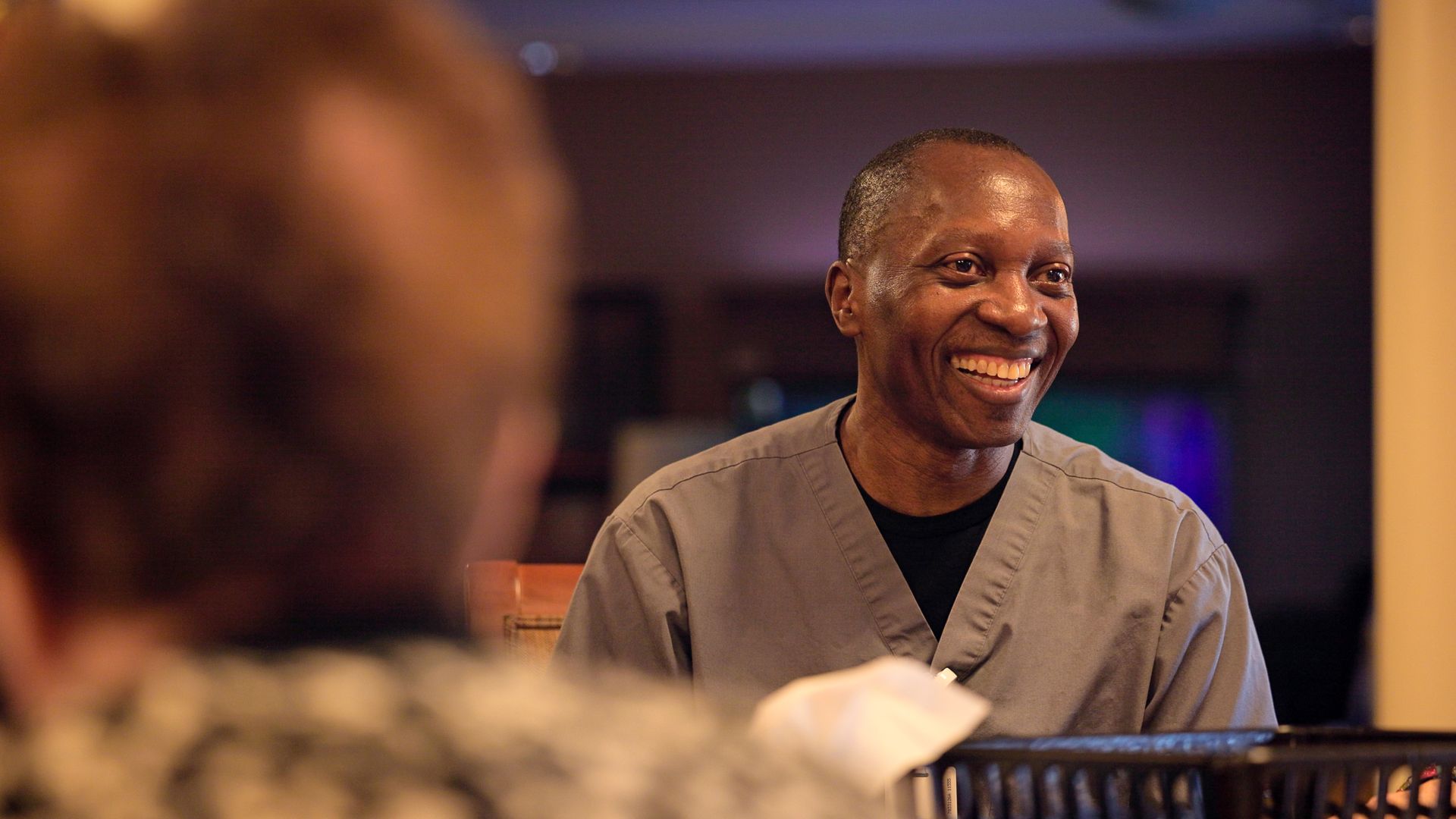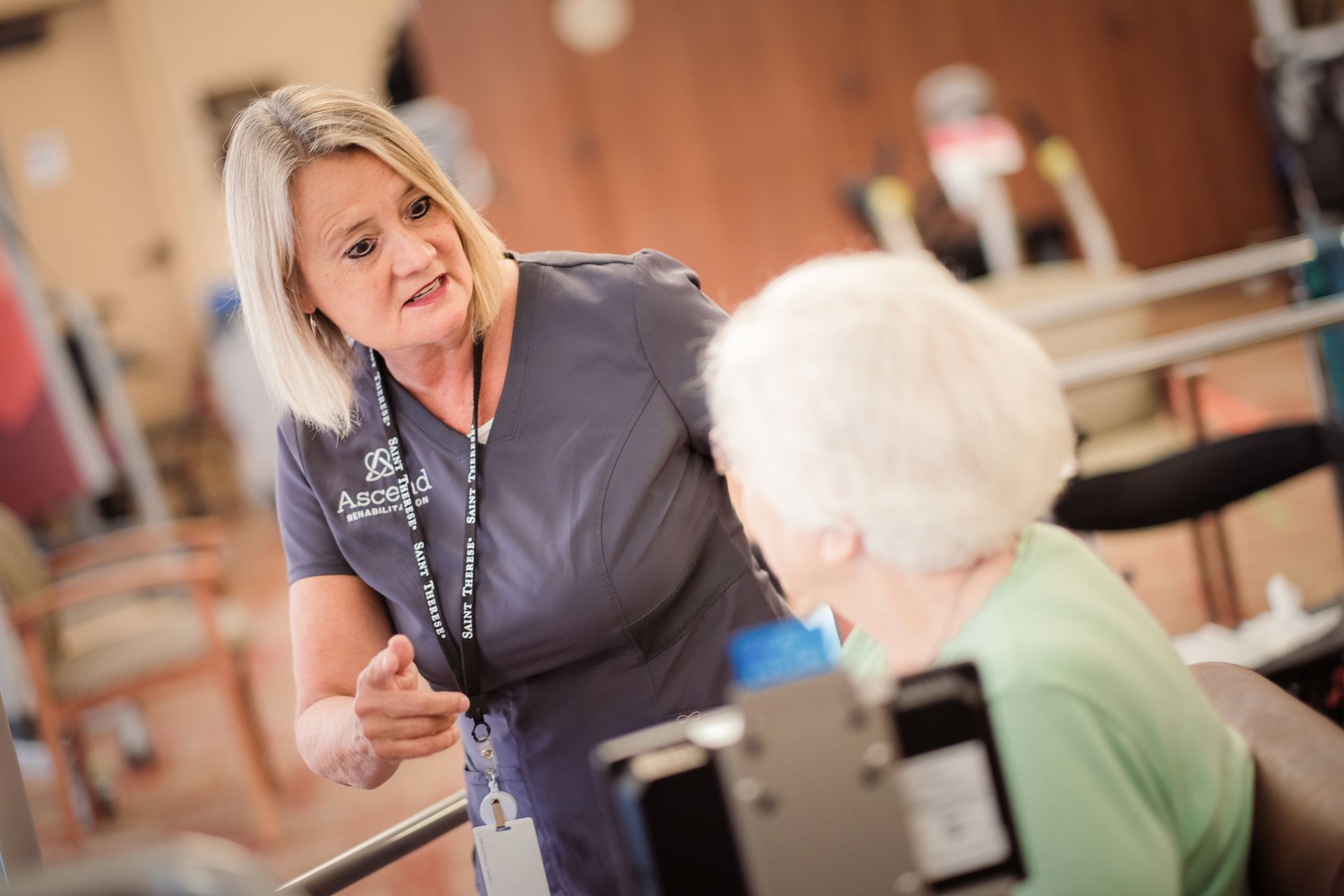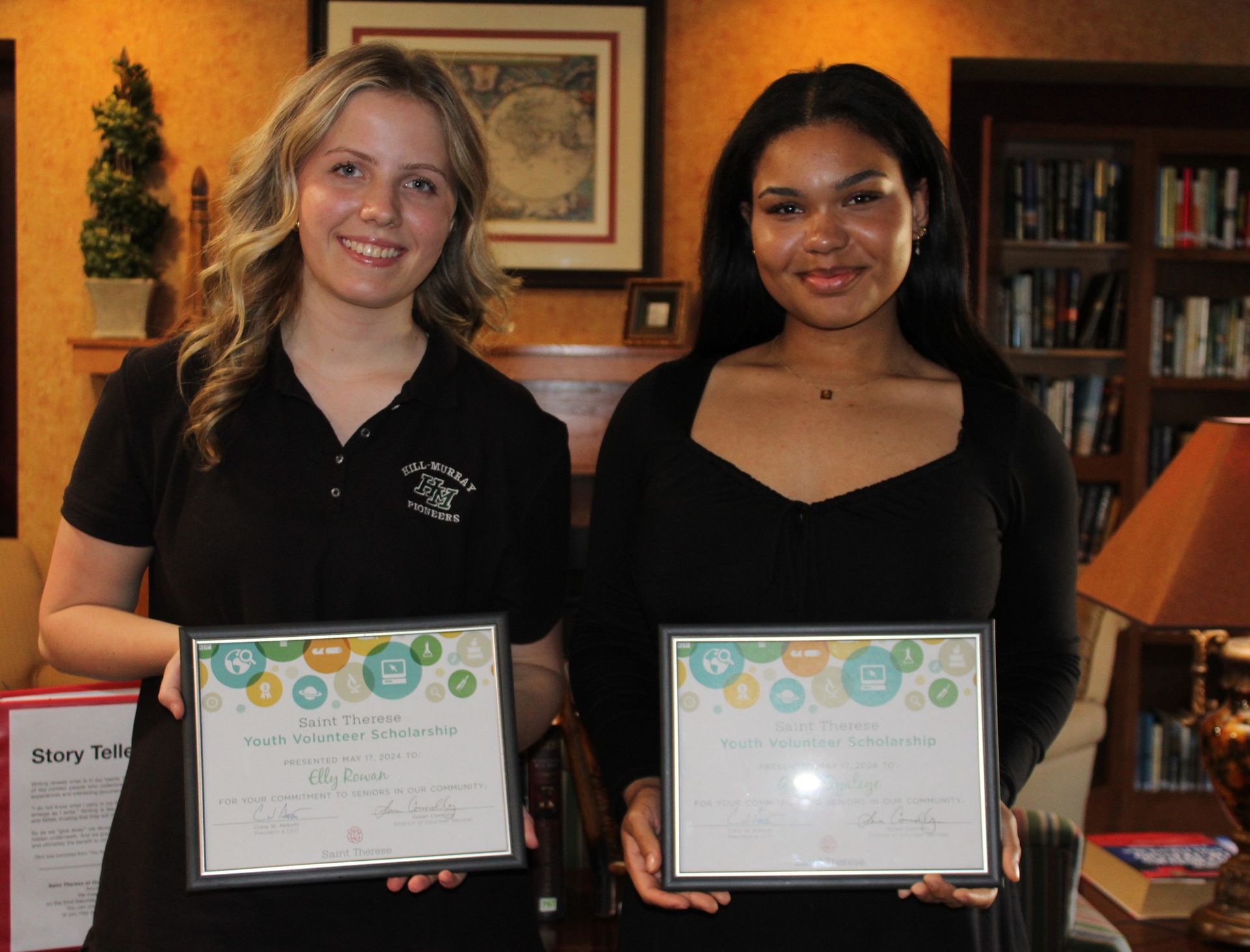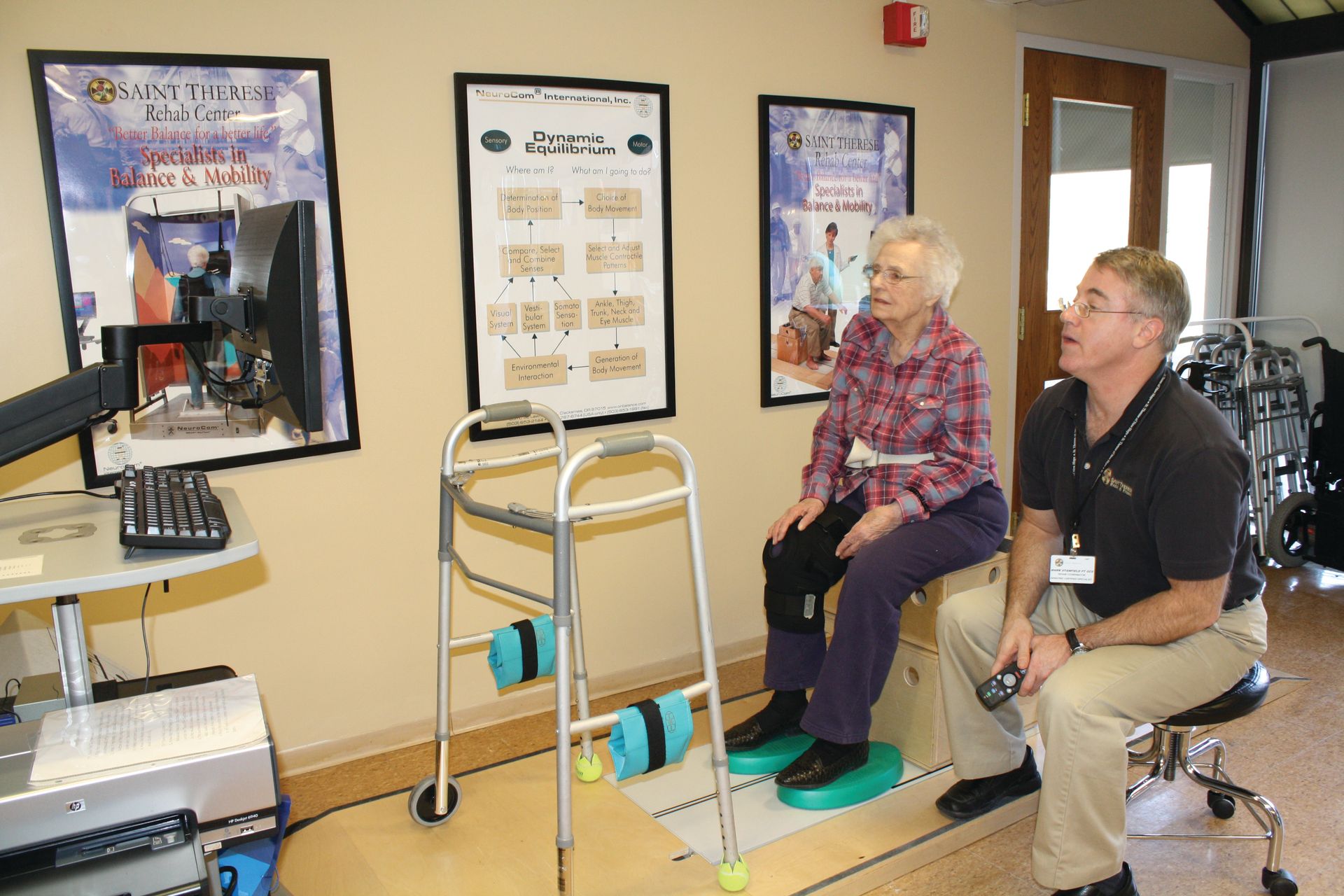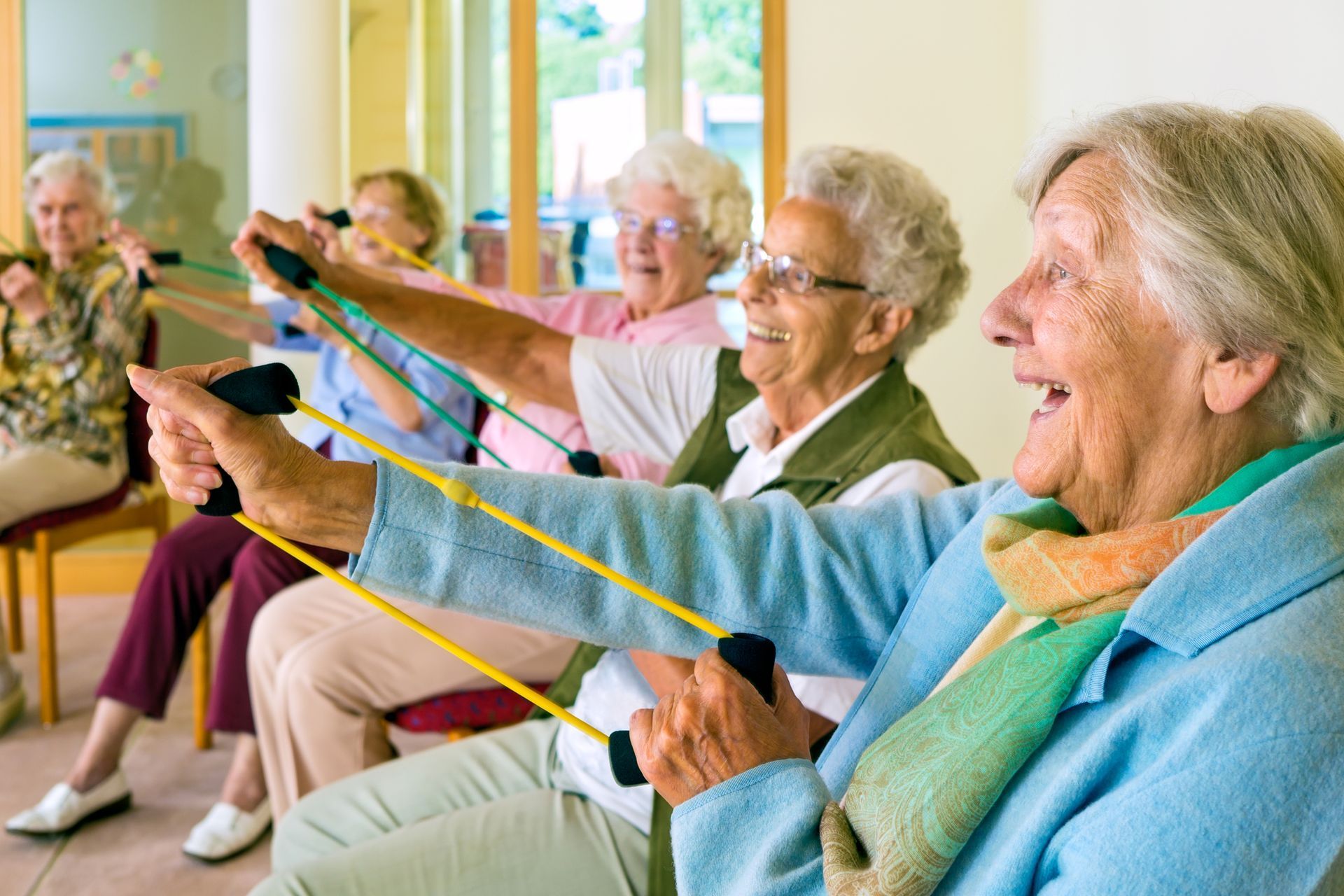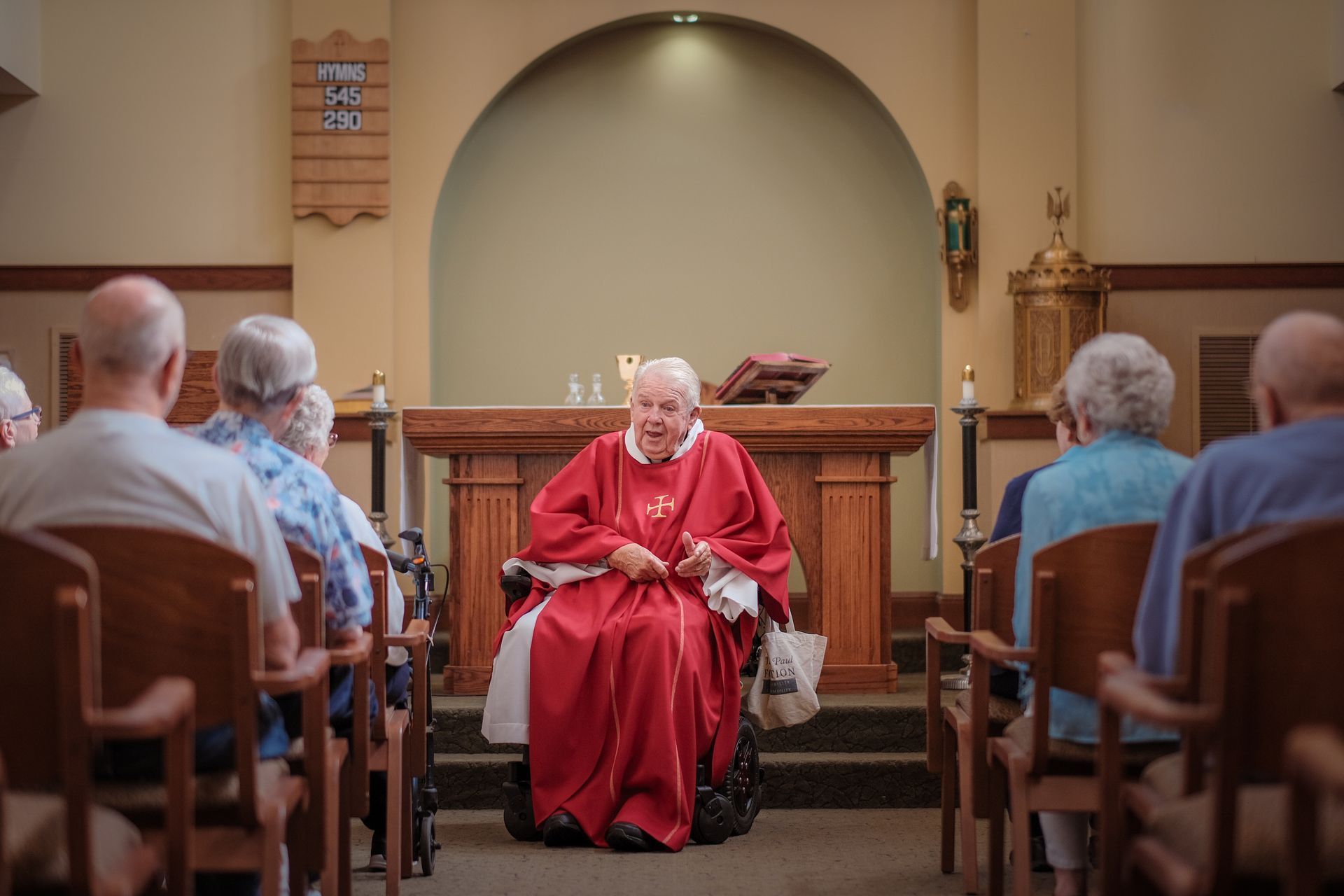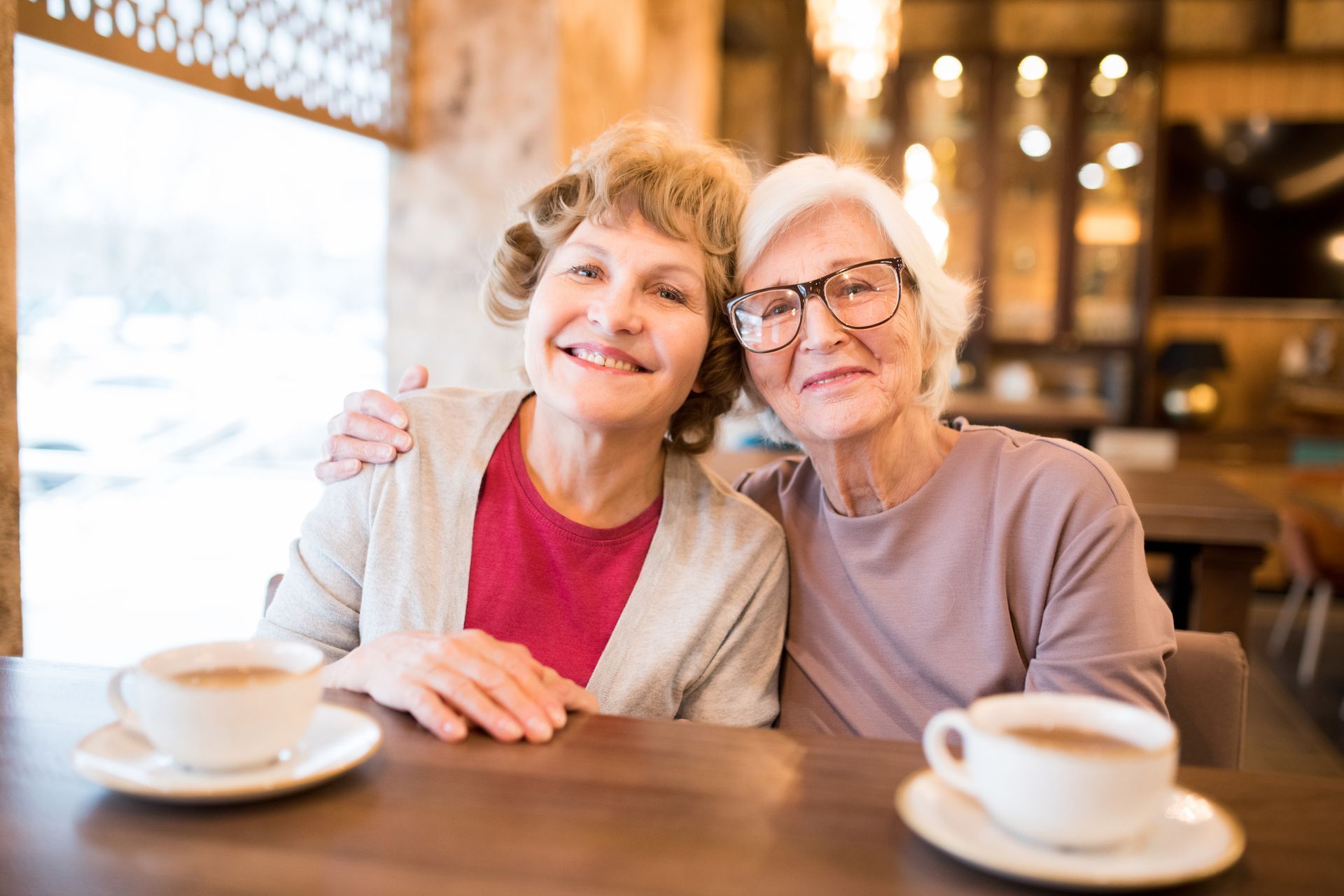Saint Therese Foundation
The generosity of our donors brings to life the unique programs and services that make Saint Therese such a truly special place to call home.
1660 Highway 100 S, Ste 103
St Louis Park, MN 55416
Making a Difference
Why Saint Therese
Your Donations Create Lasting Impact!
Our donors have been central to our mission to do ordinary things with extraordinary love since we first opened our doors in 1968. As a nonprofit, we rely on the generosity of our residents, families, friends and the community partners to help us continue to provide continue delivering the highest quality housing and care to seniors. Many of the unique programs and services that make Saint Therese such a special place to call home are made possible by the generosity of donors.
Living Well
With the support of the community, we work every day to enhance the care and programs we provide to help ensure those we serve live well. With special offerings such as: robust pastoral care programs, peaceful worship spaces, special outings and beautiful landscaping that surrounds each of our buildings.
Inspire Innovation
The generosity of donors inspires innovation and gives us the resources to explore new ways to serve individuals at Saint Therese. Initiatives such as our balance and aquatic therapy programs were made possible by donors. Now we are able to help residents and guests achieve better balance and improve their active lifestyles.
Secure Financial Strength
Contributions help us secure financial strength for our future through organizational and named endowments. When designated, these donations help ensure the exceptional work Saint Therese is doing will continue for years to come.
You can make a one-time or recurring gift in a variety of convenient ways to support the mission of Saint Therese:
Online Donations:
Make a secure online donation here.
Gifts by Mail:
Download, print, and complete our charitable gift form. Mail it with your donation to:
Saint Therese Foundation
1660 S Hwy 100, Ste 103
Saint Louis Park, MN 55416
Electronic Funds Transfer (EFT) Gifts:
Set up automatic giving by completing our EFT Authorization form and mailing it with a voided check to the address above.
How to Give - Planned Gifts, Stock, In-Kind Gifts, and Employer Matches
Planned Gifts: When you include Saint Therese in your estate plan, you make senior care part of your legacy. To learn more visit our planned giving page.
In-Kind Gifts: Please contact us at 952-283-2212 if you wish to donate items or services.
Stock Gifts: Please use the following information to make a securities transfer.
- Brokerage Firm: The Depository Trust Company*
- Contact: U.S. Bank, 651.466.6259
- Name on Account: Saint Therese Gifted Securities
- Account #: 5003041-003
- Participant#: 2803
- Federal ID#: 41-1704381
*The Depository Trust Company does not automatically notify us when transfers are made. We want to be sure to acknowledge your support in an accurate and timely way. Once the transfer is made, please notify us at 952-283-2212.
Employer Matches: Check with your human resources department to see if your employer will match your contribution. Employer matching gifts are a great way to enhance the impact of your gift.
Gift Designations
Each donor brings a unique perspective and reason for giving. You can designate your gift to an area that is meaningful to you:
Annal Fund: Support urgent priorities across our communities or you may designate your gift to the greatest need at a specific community.
Pastoral Care Fund: Sustain spiritual care programs for residents and families.
Caring Fund: Assist those who have outlived their financial resources.
White Rose Scholarship Fund: Help staff pursue advanced education and professional development in senior living care.
Mark Stanfield Memorial Scholarship: Support continuing education for Ascend Rehabilitation therapists.
Barbara A. Rode Endowed Fund: Advance quality care and innovation in senior services.
Tribute Gifts: Honor or remember a loved one with a meaningful contribution.
Other Designated Gifts: Partner with us to align your giving with current needs and personal passions.
Annual Fund
The Annual Fund supports our ongoing operational expenses and general program needs through unrestricted donations that allow the Saint Therese Foundation to make a more substantial impact in our communities by funding mission critical needs as they arise. This flexibility ensures that we can address the most pressing needs, support our overall mission and operations and build long-term sustainability.
By making an annual donation to the general operating fund of the Saint Therese Foundation or the general operating fund of one of our communities you will automatically become a part of a special group of donors. The Annual Fund has six giving societies that are tiered based on the amount of general operating gifts you make during the calendar year. Each society comes with the specific benefits detailed here.
Memorial Giving
Honor the memory of your loved one and carry on their legacy at Saint Therese by making a tax-deductible gift. Your loved one can be remembered through the difference you and other loved ones make by donating in their memory.
- How do I list Saint Therese in my loved one’s obituary? List Saint Therese Foundation in your loved one’s obituary for others to give in their memory.
- What do Memorial Donations Support? Unless designated to a specific program or Fund by the family or donor, memorial donations go to the general operating fund for the deceased’s community. To specify a program or fund for memorial donations call 952.283.2212 or email development@sainttherese.org
- Will the family be notified about any donations that are made? Upon request by a family member or the donor, the Saint Therese Foundation sends notification of memorials received with name and contact details (gift amounts are not disclosed). Donors are also sent a thank you and acknowledgement letter from the Saint Therese Foundation.
- Can my donation remain anonymous? Yes, please include this request with your donation information
Be Part of something bigger
Foundation Events
Throughout the year, the Saint Therese Foundation hosts memorable events to raise funds that support our communities. Many of our specialized services, amenities and programs exist because of the generosity of our donors and partners.
We invite you to join us at our fundraising events, which include:
The 20th Annual Golf Classic raised over $141,000 to support our mission, uniting the community for a memorable day of generosity.
Join us for the very first Woods Classic at the beautiful Red Tail Golf Club in Avon, Ohio!
Pay tribute to another during the Christmas season with a financial contribution to Saint Therese.
Show your support and help us fulfill our mission to do ordinary things with extraordinary love by becoming a year-long or event sponsor. Sponsorships may be customized to fit your budget or philanthropic goals.
why give
Employee Giving
Saint Therese is a non-profit that relies on the financial gifts made by our donors to fund employee scholarships, pastoral care, community life programs, and amenities that make Saint Therese a special place for our residents to live this chapter of their lives. Working at Saint Therese is a rewarding experience; while every job comes with challenges, our residents positively impact our lives. An employee from the Oxbow Lake community said it best:
“It’s very important for us to not underestimate the wisdom that is held within the hearts of each individual here. There is so much to learn from our residents. There is beauty in when we give person centered care we also receive it from them. What you pour out comes back to you ten times more.”
Our residents’ quality of life is directly affected by the generosity of contributions by you through our Employee Giving Campaign. You can make a big difference in our residents’ experience for as little as $1 a week!
Ways to Give
Employees can make a one-time or recurring gift in a variety of ways.
- A secure online donation via payroll deduction or credit card.
- Print the
Employee Giving Enrollment Form and return to your HR office or scan to
development@sainttherese.org.
Gift Designations
This year, there are several key priorities employees can support.
- White Rose Scholarship Fund: The White Rose Scholarship Fund provides scholarships for our staff to further their education and enhance their skills through professional development.
- Mark Stanfield Memorial Scholarship Fund: The Mark Stanfield Memorial Scholarship Fund supports the continuing education of therapists with Ascend Rehabilitation who exemplify the excellence of our late colleague, physical therapist Mark Stanfield.
- Saint Therese Foundation General Operating Fund: With your support we can fund mission critical needs as they arise. This flexibility ensures that we can address the most pressing needs, support our overall mission and operations and build long-term sustainability.
Community benefit
Gratitude Report
As a nonprofit organization, Saint Therese pledges to act as a resource, improve access and affordability to care, identify and address evolving health care needs and promote living well for all those we serve. Your generous donations help make a difference for our residents, our staff and our communities.
Gratitude Report
We are so grateful for the many ways our donors have chosen to support us and are pleased to share information on our work with you. Our Gratitude Report has financial information for the period January 1, 2024 through December 31, 2024.
Donor Recognition
The generosity of our donors inspires us to thoughtfully guide each gift received in ways that continue to promote senior well-being and support our efforts in making a difference through comprehensive programs and activities. We gratefully acknowledge the individuals, corporations, foundations, and associations on the lists below who helped to drive our mission. To view each donor list, click on the link. For a printed copy, call our staff at 952.283.2219.
- Heritage Society: Members of the
Heritage Society have chosen to strengthen their support in our mission through a planned gift or through an outright contribution of $10,000 or more to a Saint Therese endowment fund.
- 12 Months of Giving: We are grateful to all of our recent supporters who helped us make a difference from January 1, 2024 through December 31, 2024.
- Cumulative Giving: For more than five decades, the heartfelt
cumulative gifts of these donors continue to impacts our residents, guests and their loved ones. We are blessed by their generosity.
- In-Kind Giving: We are grateful to all of our donors who provided
gifts of goods and services from January 1, 2024 through December 31, 2024.
- Endowments: Empowered by a passion for serving seniors, some donors have established named endowment funds to designate support to impart values lasting beyond a lifetime.
Scholarships
Saint Therese proudly maintains partnerships with other organizations who also strive to enrich the lives of others - starting with those in and around our neighborhoods.
Each year, Saint Therese offers the following scholarship opportunities:
Youth Volunteer Scholarship
Saint Therese honors volunteer service and encourages intergenerational relationships between youth and seniors with the annual Youth Volunteer Scholarship Award. We select three students in grades 11-12 to be honored for their service, each with a $2,000 educational scholarship.
White Rose Scholarship
Inspired by our mission, Saint Therese encourages our employees to further their education and improve upon their knowledge of senior care. We award several thousand dollars in scholarships to employees each year through the White Rose Scholarship.
Mark Stanfield Memorial Scholarship
The Mark Stanfield Memorial Scholarship supports the continuing education of full-time physical therapists with Ascend Rehabilitation who exemplify the excellence of our late colleague, physical therapist Mark Stanfield.
Contact us for more information about our scholarship programs and other ways Saint Therese gives back to our communities.
The Saint Therese Foundation is a 501(c)3 nonprofit organization. All donations are tax-deductible to the fullest extent of the law. Once your donation has been processed, we will mail an acknowledgment letter with gift totals for your records.
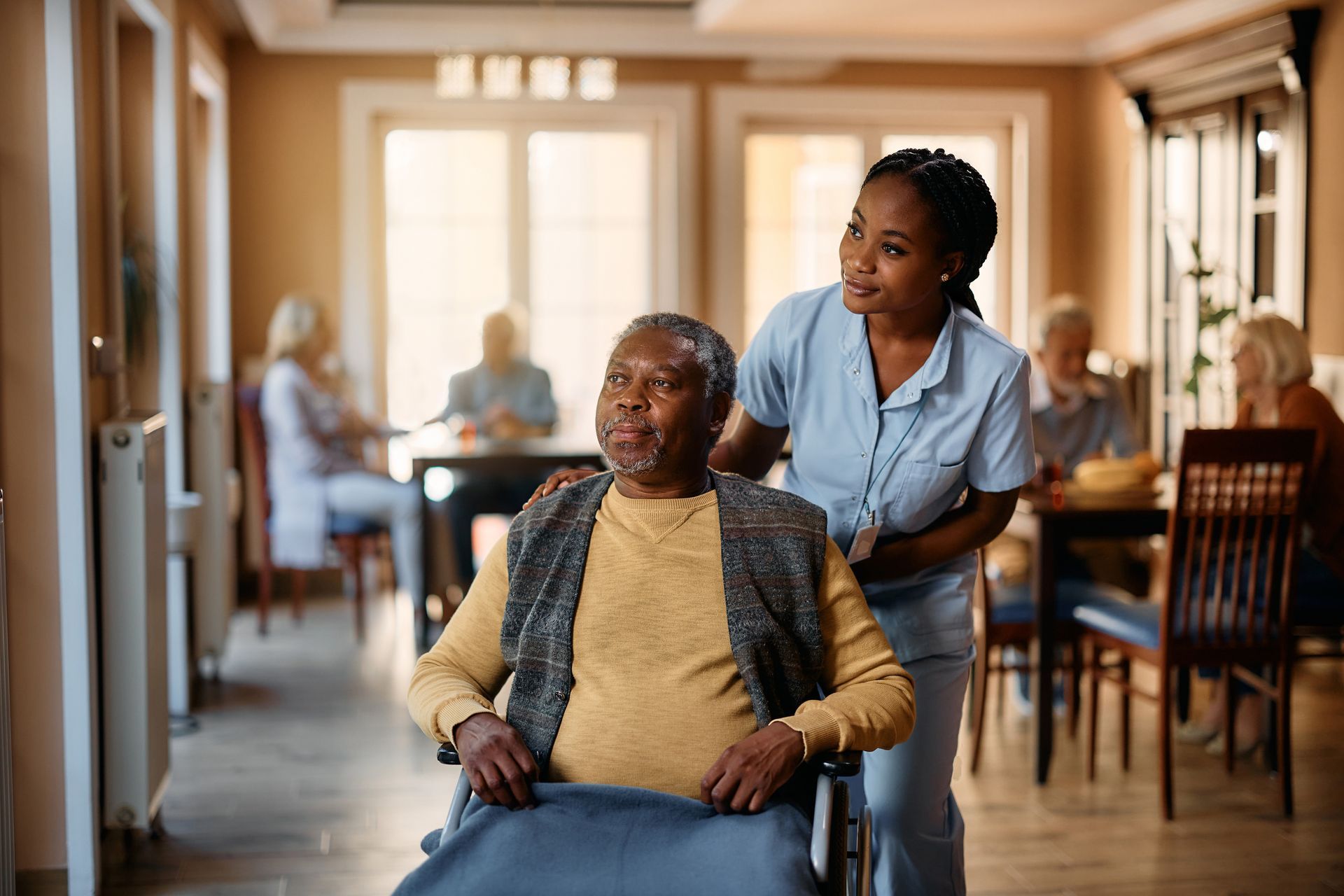

CAREER OPPORTUNITIES
Find Your Purpose at Saint Therese
Saint Therese is now hiring for Nursing, Dining, Administration, Maintenance, and more!
At Saint Therese, we value and appreciate the differences that make our employees unique. Together, we make up a team with a passion to serve others.


